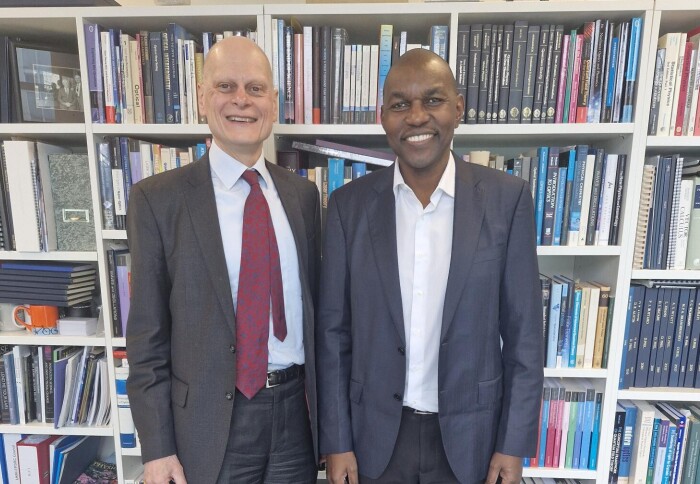Provost’s Visiting Professors Programme Celebrates Third Cohort

Professor Thumbi Ndung'u joins Imperial to complete the third cohort of the Provost's Visiting Professors Programme
Imperial College London is delighted to welcome Professor Thumbi Ndung’u as the final Provost’s Visiting Professor (PVP) in the programme’s third cohort.
Professor Thumbi Ndung'u is a world-renowned immunologist and HIV/AIDS researcher, recognised for his contributions to understanding the immune response to HIV infection and developing strategies for an HIV cure. His work focuses on the complex interactions between the virus and the host immune system, as well as the genetic and biological factors that influence disease progression and treatment outcomes.
Launched in 2021 by Provost Professor Ian Walmsley, the PVP programme brings distinguished academics to Imperial, enriching the community through scholarship, teaching, and research-driven programming.
With a strong commitment to equity and inclusion, the programme is specifically designed to recruit women and academics from Black-heritage and other underrepresented backgrounds. Its long-term goal is to increase diversity within Imperial’s professorial staff, supporting the university’s broader efforts to foster a more inclusive academic environment.
Learn more about Imperial’s commitment to equality, diversity, and inclusion (EDI), including the support and resources available to staff and students, here.
Provost’s Visiting Professor (PVP) Third Cohort
Professor Casper Nyamukondiwa

Professor Casper Nyamukondiwa is based at the Botswana International University of Science and Technology (BIUST).
Professor Nyamukondiwa's work primarily focuses on how environmental stressors, such as temperature extremes and droughts, affect the survival, behaviour, and adaptation of insects, with a particular emphasis on species of agricultural and ecological importance. He leads pioneering research in insect ecophysiology. His expertise spans insect thermal tolerance, pest management, and the ecological impacts of climate variability. His research has been pivotal in understanding how climate change affects insect populations and ecosystems, providing crucial insights for developing sustainable agricultural practices and pest control strategies in a rapidly changing climate.
Professor Olubukola Babalola

Professor Olubukola Babalola is currently a Professor of Microbiology at North-West University (NWU) in South Africa.
Professor Babalola leads groundbreaking research in plant-microbe interactions, soil microbiomes, and biofertilizers. Her research has been crucial in developing sustainable solutions for food security in regions facing environmental challenges, such as drought and poor soil quality. She is committed to finding innovative ways to reduce the reliance on chemical fertilizers and pesticides, emphasising natural, biological alternatives to improve agricultural productivity while protecting the environment.
Professor Anita Patel

Professor Anita Patel is currently an Honorary Professor at Queen Mary, University of London.
Professor Patel has spent her career at the intersection of health economics and public policy. She is widely respected for her expertise in evaluating healthcare interventions, assessing the value of new technologies, and helping to inform policy decisions that optimize the use of healthcare resources. Her research has been instrumental in shaping policies that ensure equitable access to healthcare, particularly in low-income and vulnerable populations. She is a distinguished health economist known for her impactful research on the economics of healthcare, with a focus on public health policy, cost-effectiveness analysis, and health technology assessment. Her work spans critical areas such as healthcare delivery, resource allocation, and economic evaluation of interventions aimed at improving population health outcomes.
Professor Mariko Okada

Professor Mariko Okada is currently a Professor at the Institute for Protein Research, Osaka University, Japan.
Professor Mariko Okada is a distinguished molecular biologist and immunologist, known for her groundbreaking research in cell signalling and immune system regulation. Her work focuses on understanding the intricate molecular mechanisms that control immune responses, which has broad implications for developing therapies for autoimmune diseases, cancer, and infectious diseases. As a leading professor at a prestigious academic institution in Japan, Osaka University, Professor Okada has made significant contributions to the field of molecular biology, particularly in uncovering how cells communicate and respond to external stimuli. Her research into cell signalling pathways, especially those involved in immune cell function, has been pivotal in advancing knowledge about how the body’s immune system can be manipulated to fight disease more effectively.
Article text (excluding photos or graphics) © Imperial College London.
Photos and graphics subject to third party copyright used with permission or © Imperial College London.
Reporter
Press Office
Communications and Public Affairs
- Email: press.office@imperial.ac.uk
